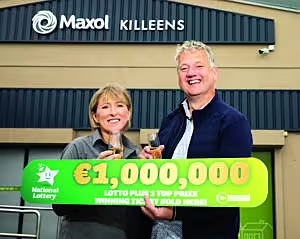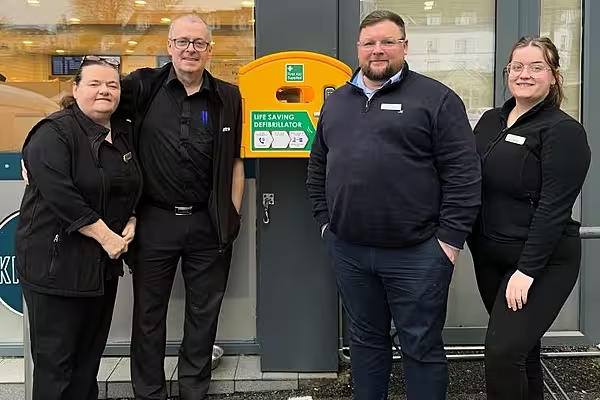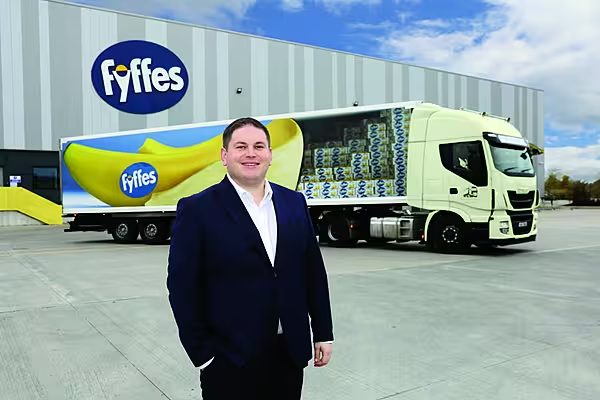Cian Murphy grew up in a family retail business. Following a career spanning various industries, he has found his way back to the retail trade in his new role as CEO of Premier Lotteries Ireland.
From the age of 12, Cian spent his summers working in his father’s shops. “It’s probably no longer allowed today, but it was a great early experience for me!” he says.
Since then, he has worked in senior marketing positions for several high-profile organisations, including Paddy Power and the AA.
In 2020, Cian joined Premier Lotteries Ireland (PLI), the operator of the National Lottery, serving as the company’s chief product and digital officer until June 2024, when he took on the role of CEO.
“The companies I have worked for have all operated in very competitive spaces, fighting every day for consumer attention and attempting to stand out from the crowd,” he says.
“I come from a marketing background, so I tend to focus a lot on the customer proposition and how we are communicating that externally.
"What is different about the National Lottery is that we sell 82% of our tickets through our retail partners.
"That leaves us a bit more removed from the end customer, which increases the need for not only a clear customer proposition and communication, but also a continued positive collaboration with our extensive retail network.”
French Acquisition

Last November, it was announced that the operator of the French national lottery, La Française des Jeux (FDJ), had completed the acquisition of Premier Lotteries Ireland.
“The acquisition by La Française des Jeux (FDJ) represents a significant milestone for Premier Lotteries Ireland and the National Lottery,” he says.
“The partnership made sense, as FDJ has a long history of successfully operating lotteries and has a track record of innovation in the industry.”
The National Lottery is strictly regulated by dedicated legislation, in addition to an operating licence and an independent regulator.
This framework regulates the games, the draws, retailer commission rates, and advertising.
“All of this remains unchanged, regardless of the shareholder,” says Cian.
“Retailers and customers will see a lot of continuity in operations.
"However, we believe that there will be some positive impact as FDJ's resources, technological capabilities, and industry knowledge will enable us to enhance our marketing, introduce new products, and improve the overall player experience.
"The collaboration will also allow us to draw on FDJ’s experience to further improve our best practice in responsible gaming and Corporate Social Responsibility, ensuring that we continue to operate with the highest standards of integrity and community focus.”
Responsible Gaming

The National Lottery implements stringent policies and practices to prevent underage and excessive play, both online and at the point of sale.
These include mandatory age verification checks for all online players, the introduction of a Think 21 ID policy in retail, the rollout of extensive signage outlining the age limit to play National Lottery games, and regular mystery shops conducted across the retail network.
In addition, their on-going retailer training programmes continue to support retailers in complying with their player protection policies under the National Lottery’s Sales Code of Practice.
“We also monitor playing patterns for signs of excessive play and provide resources and support for players who may need help,” says Cian.
“Our commitment to responsible gaming is unwavering, and we continually review and enhance our policies to ensure that they meet the highest standards of player protection.”
Cian has set himself several key objectives for his first year as CEO.
“The National Lottery runs first and foremost on trust,” he says.
“Players, retail partners and regulators all need to trust in both the National Lottery and PLI’s ability to run it competently.
"The most important job for us every year is to ensure that we protect and enhance that trust. This is the reason why reliability is one of our core values.
“Secondly, I want us to invest in the growth drivers behind the National Lottery. This will include investing in in-store displays and merchandising with our retail partners.
"We’re very aware that how we show up in stores is key to how both players and our retail partners perceive us.”
High participation The National Lottery in Ireland is one of the highest participation lotteries in Europe, with around three in four Irish adults participating every year.
On average, 1.1 million adults play National Lottery games in a given week.
“There are very few products that have that broad participation base,” says Cian.
“What is also quite unusual about the lottery is that participation is quite consistent across gender, income, geography etc. We really do attract the entire population.”
Currently, there are over 5,000 retail outlets across Ireland selling National Lottery tickets, making their games widely accessible to players nationwide.
Given the size of its retail network, Premier Lotteries Ireland doesn’t have any plans for further expansion.
For now, it is about continuing to focus investment on the current network and work closely with their retail partners “to ensure ease of access to the National Lottery for all players, in line with evolving shopper behaviour.”
In terms of their marketing collateral in-store, the focus will be on local win stories.
“We are embarking on a programme that will highlight National Lottery wins across our portfolio through the stores that sold those winning tickets,” he says.
“Last November we launched EuroDreams, a twice weekly annuity game where players can win €20,000 per month for 30 years. It is an innovative and exciting addition to our Jackpot-based games which appeals to a younger generation.
"This was the biggest launch since Euromillions in 2004, almost 20 years ago. It has been very well received, and I expect to see us build on this success with possible new games in the coming years, with changes to our draw-based games and scratchcards.”
Retailer Partnerships

Working with retailers across the country is an important part of Cian’s role as National Lottery CEO.
“Retailers are the backbone of our distribution network and a key part of the social and economic hub of local communities, providing employment, supporting local initiatives and contributing to the vitality and viability of Irish town centres and communities,” he says.
“This is why they are natural partners for the National Lottery and their success is integral to our success. We are still a business that is 82% retail.”
Cian points out that the National Lottery is competing with a host of different (and often unregulated) games, so continuous innovation is crucial.
“PLI regards the retail agents' network as core to our operation and is committed to supporting them through new information, communication and technology investments,” he says.
“To strengthen our relationship with retailers, we plan to focus on investment in our point of sale, and in more open communication and collaboration.
"This includes providing retailers with the tools and support they need to effectively promote National Lottery products, as well as offering tailored training programmes to enhance their understanding of our games and responsible gaming practices.
"By fostering a strong partnership with our retailers, we can ensure that they continue to play a vital role in our growth strategy, while benefiting from their association with the National Lottery.”
According to Cian, becoming a National Lottery retail agent offers several key advantages.
“Being associated with the National Lottery can increase foot traffic to their stores, as players often purchase other items while buying lottery tickets,” he says.
“Additionally, it provides a reliable and consistent source of income through commissions on ticket sales and prize payouts.
"Retail agents also benefit from our comprehensive support system, which includes training, marketing materials, and regular updates on new games, promotions and good causes that are supported locally and nationally.
"Furthermore, the National Lottery's reputation for integrity and community support can enhance the overall credibility and appeal of a retail location. By partnering with us, retailers can offer a product that is trusted, popular, and beneficial to their business.”
Lottery betting

Despite high levels of participation, strong marketing collateral, and gaming innovations, Cian points out that changes to how people shop and the move to cashless, self-serve and, of course, online, will all have a knock-on impact on footfall for National Lottery retailers.
“In the five years from 2019 to 2024, National Lottery sales online went from 9% to 18%,” he says.
“Most of this increase came during Covid but it has been quite slow since then, and we expect this general trend to continue in the coming years, so we will continue to support both business channels and explore digital retail opportunities to drive omni-channel play.”
Ensuring the continued success of National Lottery retailers and continuing to grow funding for Good Causes is “an important personal goal” for Cian.
“A crucial aspect of this will be the implementation of a bookmaker betting ban for all National Lottery games,” he says.
“Over the last five years, our research indicates that our retail agents have potentially lost commission worth €61 million in consumer expenditure that was diverted to lottery betting.
"This means that an average retailer lost out on approximately 25% of total commission, as well as the extra footfall associated with that activity.
"The prevalence of lottery betting in Ireland represents a direct challenge to retailers in the form of lost commission at a time when retailers are facing extreme cost pressures right across their businesses.”
According to Cian, Ireland is an outlier in a European and international context by permitting bookmakers and other unregulated providers involved in lottery betting to accept bets on draws operated by the National Lottery.
“We would encourage Government to follow most EU countries in closing this loophole, which we believe has a significant impact on our Good Causes and retail agents,” he says.
Socio-Economic Impact
The National Lottery regularly commissions independent research to assess its socio-economic impact.
A 2018 report by Indecon Research Economics looked at the broader effects of their operations, including the benefits to local communities through the funding of Good Causes, as well as the economic contributions made through the National Lottery’s retail network.
These studies provide valuable insights into how the National Lottery supports job creation, community development, and social initiatives across Ireland,” says Cian.
Although not commissioned by the National Lottery, a 2021 report from Benefacts showed that the National Lottery accounted for 34% of all charitable giving in Ireland. Since 1989, the National Lottery has raised over €6.5 billion for Good Causes across Ireland.
“Each year, a significant portion of our revenue is allocated to a wide range of community, health, arts, and sports initiatives,” says Cian.
“These funds have a profound impact, reaching into every corner of the country and supporting projects that make a real difference in people’s lives.”
The Good Causes Awards is an annual event that celebrates and recognises the work being done by organisations that have received funding from the National Lottery.
“These awards highlight the projects we support, from local community groups to national charities such as Barnardos and Belong To LGBTQ+ and sporting organisations such as Special Olympics Ireland,” he says.
“It is a way for us to showcase the positive impact of the National Lottery and to thank the players who make it all possible.
"We look forward to announcing the winners of the Good Causes Awards at the awards ceremony at Killashee House Hotel on 12 October.”
Read More: Costcutter Dunmanway – Practical, Pretty and Profitable









